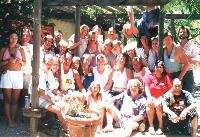1. "What a
ridiculous rule."
2. "I should be able to express my whole self at all
times."
3. "I run sexual energy all of the time. You're asking me
to shut it down."
4. "I can see not being sexual in the workshop, but why
not afterwards."
Sex can be a
wonderful way of getting close to another human being. It
can be an expression of love and caring, an experience of
safety and intimacy. It can make life richer, warmer,
easier. It can help a person remember the truly benign
nature of human beings. Sex can be a place where each
partner can show themselves more fully than usual and
experience being accepted and loved deeply. Sex can be
fun.
Unfortunately, most
people do not experience sex in this way very often, if
ever. In order to experience even some of the benefits of
sex, people will endure many difficulties, overlook many
unsolved problems.
It appears that
almost everyone has been badly hurt in the area of sex.
("Abusers" are simply people who were badly abused as
children themselves.)
Sex is not as
important as it is made to seem. However, capitalist
societies manipulate people to keep them preoccupied with
sex, to keep them feeling bad about themselves, and to
keep them buying products they wouldn't want
otherwise.
Human beings need
closeness, touching, and loving. In present societies
people are taught that sex is the only acceptable way to
fully meet these needs. However, these needs can be met
without sex. Many graduate's experience has been that as
they become able to snuggle , touch, and be close, often
with many people in their lives, preoccupation with sex
diminishes or disappears. Thus sex loses much of its
false "importance."
Difficulties with
sex are also an indication of unhealed hurts. These hurts
often impose severe limitations on other areas of our
functioning. Hurts in the area of sex can affect our
sense of power, well-being, confidence, trust,
creativity, and physical mobility along with our ability
to choose, to desire, to think clearly, to set up good
relationships, to be close. Thus full recovery of one's
complete humanness requires discharging the distresses
which have become attached to sex.
Any time a person
experiences sexual arousal without first having decided
to, it is almost certainly a restimulation of an old
distress which contained sexual feelings. These physical
responses are attached to recordings of emotional
distress, which can seem "negative" or "positive" in
flavor. Most people rely on knowing how to restimulate
sexual arousal in themselves and others in "socially
acceptable" ways when they engage in sex. ("If you speak
in this tone of voice, if the room is lit in this way, if
we walk on a beautiful beach, etc., I will become
sexually aroused." Without distress, two people who love
each other very much, can snuggle and hold each other
close, skin to skin, without sexual feelings, unless they
decide otherwise.
An Aware
Choice
We can ultimately
have control over sexual feelings. Meanwhile, we can
decide whether or not to act on any sexual feelings we
may have. An aware choice can be made about whether a
particular relationship is a "right" relationship in
which to add sex. For many people, this brings to mind a
cumbersome process of many sessions, consultations,
list-making of pros and cons, and so on, before deciding
to have sex. This might not be a bad idea for a while,
but people can eventually develop good judgment which
they can learn to call upon quickly and
easily.
It seems that
without distress, human beings experience a relaxed
desire for sex in some situations. (Sex can be an elegant
way of being close to someone you care about when
everything else makes sense.)
There seems to be
an instinctive survival drive towards sex inherited from
our pre-intelligent forebears, which exists after
adolescence. (There is also an instinctive high-priority
survival drive in our human heritage attached to eating,
which operates from birth onwards.) As with all inherited
instinctive drives for humans, these come under the
control and management of our intelligence unless
distress patterns become attached to them. In our
societies distress patterns are almost systematically
attached to these instincts about sex and food through
the operation of the patterned cultures.
Most societies have
made it very difficult for people to distinguish between
a desire for love, touching, and closeness and a desire
for sex. Needs for love, touching, and closeness are very
real and large, yet most people have been taught that
these needs can only be met through sex. Judging what
makes sense in a given situation is much easier if you
can tell whether you are actually interested in sex or if
it is love and closeness which you want.
This explains a
phenomenon which many people are familiar with - deciding
to have sex, and then feeling both good and bad "in the
morning." Good because needs for touching and closeness,
and maybe love as well, were met. Bad because meeting
those needs involved rehearsing distresses related to sex
one more time.
These real needs
for love, touching, and closeness have become "frozen."
Until the recorded feeling of need is discharged, a
person may never feel sufficiently loved, for instance,
regardless of the actual situation. Most people also have
blocks on their ability to love, be close and intimate
aware touching. The rational need to express love and to
initiate aware closeness and touching seems to be greater
than the rational need to receive them; thus, contrary to
the way people often feel, there need be no actual
shortage of love and closeness in the world.
Sex can function as
the best contradiction to isolation for some people.
During sex, people can notice that they are not alone,
often discharging deep hurts, which may be an unusual
occurrence otherwise. Whether they realize it or not,
they may seek out opportunities for sex as a form of
needed reassurance and a way to keep their lives going
well. The behavior may be combined with compulsions, but
compulsive sexual behavior by itself does not offer any
helpful contradictions. Without seeking closeness through
other means, however, such sexual behavior may
inadvertently reinforce the isolation it seeks to
end.
Sexual
"Compulsions"
Sexual
"compulsions," or addictive compulsive sexual behaviors,
have often required great persistence and sharp
counseling to overcome. As with food and eating, the
process of trying to fill rational human needs, in this
case for closeness and affection, can serve to solidify
the distresses attached to them. Eating and sex also have
physiological aspects which become additional parts of
any distress recordings, further complicating the
recovery process.
For most people
overcoming sexual compulsions requires a combination of
decision, solid work on early sexual memories, and sexual
fantasies, and reaching for real human closeness in the
present. A key element is a decision to stop the
addictive behavior, and to discharge whatever feelings
come up in the absence of acting out the compulsion or in
the attempt to stop acting it out. At the same time,
consistent work on early sexual memories drains the
restimulation's feeling the compulsion, and assists one
to distinguish the present from the past.
In addition to
efforts at ending isolation generally, people with
compulsive sexual behavior need to reach for real human
connections as a specific contradiction when the distress
recordings try to take over.
It is important in
the process of working on a sexual compulsion to
discharge any feelings of shame for not having already
overcome the addiction or for failing in repeated tries
to overcome it. These feelings of shame will only
increase the pull to repeat the compulsion. Also, a
common mistake is to assume that the best contradiction
to the shame is to celebrate and repeat the
addiction.
This is not an
intellectual concept. Full recovery of one's complete
humanness requires releasing the unhealthy behaviors
which have become attached to sex by developing a clear
reference point within the body of non-sexual
intimacy.
Sex is not
essential to our well-being, closeness is.
*
How Stan Dale spelled intimacy - in-2-me-u-c.

* * *
All growth is a
leap in the dark, a spontaneous, unpremeditated act
without benefit of experience. Henry Miller


